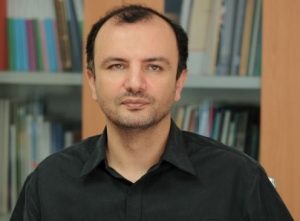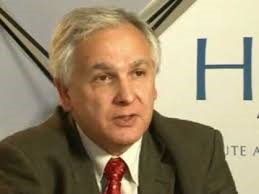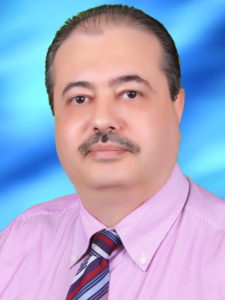Arnold Bosman is a medical doctor, trained as an epidemiologist and medical consultant in public health. Until 2016 he headed the Public Health Training Section at the European Centre for Disease Prevention & Control (ECDC). During his 10-year tenure, he was leading the development of a new training program in Public Health Microbiology ‘EUPHEM’, the design and development of an online community platform for public health information sharing ‘FemWiki’ and the design and development of the ECDC Virtual Academy ‘EVA’. Prior to that he was chief scientific coordinator for the European Program for Intervention Epidemiology Training ‘EPIET’. He now heads an international public health education and consulting company “Transmissible” and provides consultations an innovative materials for public health training.
Dr. Mohannad Al-Nsour is an internationally recognized expert in field epidemiology, research and public health systems. Dr. Al-Nsour assumed several positions as a researcher, advisor, and director in Jordan. He also served as a consultant on several assignments with the US Centers for Disease Control and Prevention, the World Health Organization and the American University of Beirut. Dr. Al-Nsour has been leading EMPHNET since 2009, by providing strategic and operational responsibilities, and guiding the enrichment of FETPs and public health in the region. Under Dr. Al-Nsour’s leadership, EMPHNET emerged as a regional entity that leads initiatives to promote public health, advance field epidemiology and improve performance of FETPs in the region. Dr. Al-Nsour is a speaker at the national and regional level covering public health topics such as leadership, field epidemiology, and creating new opportunities. As a certified trainer, Dr. Al-Nsour has extensive experience in training both at the national and regional levels, with outstanding teaching skills. His areas of expertise are infectious diseases, non-communicable disease and cancer epidemiology.
Dr. Arash Rashidian (MD, PhD) is the Director of Information, Evidence, and Research in the Eastern Mediterranean Region (EMR) of the World Health Organization in Cairo, Egypt. In this position, he leads the regional agenda of the WHO as related to five areas of work: Health Information and Statistics; Research Development and Innovation; Knowledge Sharing and Production; Editorial, Publishing and Web Support; and Official Languages Support. The division is responsible for three major priority programs for the region: 1) development of valid and time health information (“core indicators program”); 2) improving valid mortality and birth data, including causes of death (“CRVS agenda”); and 3) improving evidence-informed policymaking. Arash Rashidian is the Executive Editor of the Eastern Mediterranean Health Journal, the flagship WHO publication in the EMR.
He moved to WHO from the position of Deputy Chancellor for Public Health and Primary Care at the Tehran University of Medical Sciences, where he was also a Professor of Health Policy and Management at the School of Public Health. He has an established career in health policy and systems development in different countries. He has extensively published in areas of evidence-informed decision making, health care financing, coverage and purchasing policies, organization of primary care and hospital services, pharmaceutical policies, quality of care and health workforce.
Previously, Arash was the founding Director of National Institute of Health Research (Iran), Visiting Professor at the Imperial College London (UK), Honorary Professor at the Shiraz University of Medical Sciences (Iran), methodological advisor to the National Collaborating Centre for Acute Care (affiliated to NICE, UK), Lecturer (Assistant Professor) at the London School of Hygiene and Tropical Medicine (UK), Visiting Associate Professor at the Aga Khan University (Pakistan), and Honorary Senior Research Fellow at the Bangor University (UK). He has supervised several PhD and MSc/MPH students, has taught at post-graduate level, and has been an editor of prestigious journals.
Rachid Salmi, MD, PhD, trained in medicine in Lyon (France) and in epidemiology at McGill University (Montreal, Canada) and at the Centers for Disease Control (Atlanta, USA). He is currently Professor of Public Health at Université de Bordeaux (France), at the School of Medicine and at Bordeaux School of Public Health (ISPED); he was the Director of ISPED from 2005 to 2017. His research is carried in INSERM U-1219 Bordeaux Population Health Research Center (Injury Epidemiology, Transportation, Occupation Team), and covers child abuse, outcome of mild head injury, and translation of knowledge for clinical and public health decision making; he also heads the Evaluation Methods Unit at Bordeaux University Hospital. He is also the President of ADELF, the Association of French-Speaking Epidemiologists.
Dr. Ghazi Tadmouri is the Dean of the Faculty of Public Health at Jinan University (Lebanon). He is also member of the Scientific Research Committee (Universities’ Association of Lebanon) and member of the editorial and peer-review boards of many peer-reviewed journals and research funding organizations. In years 2010-2012, he also served a as member of the Higher Committee for Health Research (Ministry of Health, UAE). In 1999, Dr. Tadmouri received his Ph.D. degree in Molecular Biology and Genetics from Bogaziçi (Bosphorus) University (Istanbul, Turkey). In years 2000-2004, he was Assistant Professor of Molecular Biology and Genetics at Fatih University (Istanbul, Turkey). In years 2007 and 2009, he conducted graduate and professional courses and workshops on Bioinformatics at the Arabian Gulf University (Manama, Bahrain) and the World Health Organization (Cairo, Egypt). In 2011, he received the prestigious Fellowship of the Royal College of Physicians of Edinburgh. In 2014, he received the title of Associate Professor in Molecular Biology and Genetics. In 2004, Dr. Tadmouri founded the CTGA Database for genetic disorders in Arab people at the Centre for Arab Genomic Studies (Dubai, UAE) and headed its development team. With a wealth of scientific publications and punctual reports, the Centre for Arab Genomic Studies created a great difference in terms of awareness towards genetic disorders at the decision-making and governmental levels. As a population geneticist, Dr. Tadmouri admires the genetic diversity in the Mediterranean region as well as its unique blend of cultures and languages. He focuses in his research on various medical, genetic, and computational aspects related to inherited genetic disorders in Arabs. On a separate track, he also conducts advanced studies on the various aspects of mapping medical research and science networks in the Eastern Mediterranean Region. Dr. Tadmouri is author of more than 35 books and international scientific articles. He presented scientific papers in more than 70 international conferences and workshops. Despite this, Dr. Tadmouri believes that scientific knowledge is only effective when translated into public practice. In line with this, he organized workshops, authored series of publications, and maintained a strong media presence in major Arab newspapers, magazines, radio, and television aiming at conveying scientific findings to the public and causing a communal impact. Born in year 1969 to a family with roots from the Mameluke cities of Tripoli and Cairo, educated in Beirut and Istanbul, and acquired professional experience in Istanbul and Dubai, Dr. Ghazi Tadmouri recognizes the Eastern Mediterranean and the Arabian Peninsula to be his large homeland. This influence appears in his linguistic capabilities and his practice of spoken local dialects from the region.
Nick joined the Department for Health at the University of Bath in 2018 as an Associate Professor in Public Health Epidemiology having joined from the University of Oxford, where he was a programme leader for the he Centre on Population Approaches for Non-Communicable Disease Prevention. His research focuses on the development and implementation of evidence based policy, with a particular focus on population level approaches to prevent non-communicable diseases (NCDs). This research covers the key areas of policy development and implementation, including the identification of health needs and appropriate policies or interventions, adaptation of policies or interventions to local contexts, implementation of policies or interventions and their scale-up and long-term sustainability. He is particularly interested in the wider/social determinants of health and multi-sectoral approaches to health promotion. Nick’s research has a global focus, with a focus on health in low and middle-income countries. He has worked with a number of intergovernmental organisations, national and international NGOs, academic institutions and policy makers including the WHO, the World Bank and the European Society of Cardiology.






